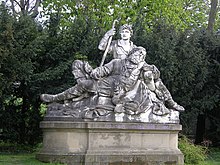Praise with a lot of beautiful speeches
The opening line of the poem The Richest Prince by Justinus Kerner is praising with many beautiful speeches . The setting of this poem is considered the unofficial national anthem of Württemberg .
Emergence
Justinus Kerner wrote the text in 1818 as a ballad in honor of Count Eberhard im Bart . The text is sung according to the melody of the folk song In des Waldes tiefstenühlen , which was created a long time before by an unknown composer and first published in a songbook in 1801. The melodic similarities with the Marseillaise are striking . The earliest joint reprint of the text and the melody appeared in 1823.
Kerner drew the material of his ballad from the historical legend about the Reichstag in Worms in 1495 , at which Eberhard was made the first Duke of Württemberg by King Maximilian I in recognition of his achievements . According to the humanist and reformer Philipp Melanchthon , the princes present should have argued about the riches of their countries at the banquet, from which Eberhard is said to have emerged victorious. Because his Land Württemberg is poor, but his prince can trust his people wholeheartedly, because even in the deepest forest he can lay his head to sleep "in every subject's lap" without having to fear attacks on life and limb. It is possible that Melanchthon confused the later Duke Eberhard with his ancestor Eberhard the Greiner . From this the legend goes that he should be attacked by Count Wolf von Eberstein during a stay in the Wildbad (today's Bad Wildbad , but possibly also Bad Teinach ) , but this was prevented by a shepherd who first warned Eberhard and said that when he was too exhausted during his escape and is said to have carried him over the mountains of the Black Forest to the protective Zavelstein Castle .
The Württemberger song, which was later made the Württemberg national anthem, shows that the count in the beard was very popular with the population and enjoyed great respect among the imperial princes. Centuries later, Eberhard still embodied the ideal of the people-oriented and just country father in a peaceful state.
The spread of the song of praise in song books and song pamphlets skyrocketed in the 1840s. It was often printed in school and general song books until the middle of the 20th century. Today the historical country song is seldom performed officially.
Between 1879 and 1881 the sculptor Paul Müller created the Eberhardsgruppe, which refers to the poem by Kerner, for the 75th anniversary of the Kingdom of Württemberg. The marble sculpture is still in the Stuttgart palace garden today.
text
- Praise with a lot of beautiful speeches
- Your countries value and number,
- Many German princes sat there
- Once at Worms in the Kaisersaal.
- "Wonderful", said the Prince of Saxony,
- “Is my land and its power;
- His mountains cherish silver
- Probably in some deep shafts. "
- "See my land in abundance,"
- Said the elector of the Rhine,
- "Golden seeds in the valleys,
- Fine wine in the mountains! "
- "Big cities, rich monasteries",
- Ludwig, Lord of Bavaria, spoke,
- “Make my country yours
- probably not inferior to treasures. "
- Eberhard, the one with the beard,
- Württemberg's beloved lord,
- Said: "My country has small cities,
- Does not carry mountains as heavy as silver;
- But a gem keeps it hidden:
- That in forests, no matter how big,
- I can lay my head boldly
- Each subject in the lap. "
- And the Lord of Saxony called
- That of Bavaria, that of the Rhine:
- “Count in the beard! You are the richest!
- Your country wears a gem! "
Individual evidence
- ↑ Ulrich Maier: The Eberhardsgruppe in the Stuttgart Palace Gardens , accessed on October 13, 2019
literature
- Susanne Dieterich: Württemberg regional history for curious people. 2 volumes. DRW-Verlag Weinbrenner, Leinfelden-Echterdingen 2002–2003, ISBN 3-87181-468-7 . About the song: Part 1, page 89ff.
- Gerhard Raff : Hie good Wirtemberg all the way. The House of Württemberg. Volume 1. DVA, Stuttgart 1988, ISBN 3-89850-110-8 , p. 348
Web links
- Praising with a lot of beautiful speeches (notes and text)
- Praising with a lot of nice speeches (MP3, 3.4 MiB)
- Praising with a lot of beautiful speeches (recording of the Fischer choirs )
- Male choir with changing historical motifs
- Literature as a monument. The Eberhards group in the Stuttgart palace garden and two historical ballads by the Swabian romantics Kerner and Uhland

